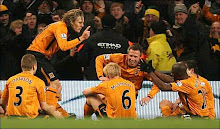
Hull City go to Chelsea this weekend. For a generation of City fans now approaching the veteran stage, there is only one trip to Chelsea to recall - and it's another of those controversial FA Cup quarter finals.
Back in 1966, the Tigers were rocking and rolling in the old Third Division, gliding to the title with ease, sumptuous football and a staggering quantity of goals. Cliff Britton's killer recruitment over the previous two years had, finally, developed a team to fear and to achieve.
Aside from the exceptional League campaign - to this day the only time the Tigers have finished top of an unregionalised division in 105 years - the FA Cup provided some extra coverage in days when publicity rarely traversed beyond the local paper. As a third tier team, the Tigers embarked on a very long run indeed, doing over Bradford Park Avenue in the first round back in November 1965 before accounting for Gateshead, Southampton, Nottingham Forest and Southport. An exhausting but thrilling run in the premier Cup contest then saw them paired with Chelsea in the quarter finals, away from home.
The game became the making of Ken Wagstaff and almost of Hull City as a whole. Despite the equivalent run to the last eight of 1971, Hull City's best post-war chance to reach Wembley was, until last season, this FA Cup run of 1966 (the 2001 play-off final would have been in Cardiff had City won the semi against Leyton Orient). For Wagstaff, the burly and skilful striker purchased 18 months earlier from Mansfield Town, a Tigers legend was created at Stamford Bridge.
City, two divisions inferior to their opponents, were 2-0 down with eight minutes remaining when Wagstaff took over. First, he tapped in an Ian Butler cross from a narrow angle which the Chelsea defence had assumed was going out of play, prior to celebrating by swinging round the goalpost in front of the baying Chelsea support. Then the most celebrated of all City players chased Dennis Butler's long pass with Ron Harris and received the ball via a deflection from the notorious defender's attempted clearance, prior to rounding Peter Bonetti and scoring.
The Shed was already silenced when infamously, a nailed-on penalty for handball was also denied to the Tigers, which could have helped afford City the most astounding and heroic of victories - not to mention a serious chance of getting to the FA Cup final as a Third Division side. Jack Taylor, later to referee the 1974 World Cup final, incongruously chose not to give a spot kick when Harris punched away Ken Houghton's goalbound header. To this day Andy Davidson, veteran skipper of gruff disposition and the man who has featured in Hull City colours more than any other player, refuses to forgive Taylor for this oversight.
Five days later, Chelsea won the replay at a bursting Boothferry Park thanks to the return of the mercurial Peter Osgood, who had been absent through tonsillitis first time round. Chris Simpkin gave the Tigers some second half hope with a superb long-range goal that brought the score back to 2-1 but eventually the Blues won 3-1 and reached the semi finals.
The penalty non-decision still rankles with everyone connected to Hull City who experienced Taylor's foolhardiness. The man himself officiated another Hull City game just a fortnight later at Boothferry Park, and allowed a Wagstaff goal from an obviously offside position to count. As they trotted back to the centre circle, Wagstaff asked the official: "Was that to make up for Chelsea then, Jack?". Taylor himself was heard to inform anyone connected with Hull City that his decision earned City a replay and the funds from 45,000 people paying at the turnstiles, and that should have been enough.
Given that City knew that they'd be facing Sheffield Wednesday, a Second Division side at the time, in the semis if they won, then this seemed to represent the best chance of Wembley the Tigers had ever had in a Cup competition. Nothing was set in stone, of course, a fact given more credence by the knowledge that City might yet have missed the penalty, and that Wednesday were victorious over the fancied Chelsea in that very semi, eventually losing at Wembley to Everton. However, victory over Stoke in 1971 - in which Wagstaff again scored twice - would have pitched the Tigers up against either Arsenal, Liverpool or Everton, three of the game's genuine giants, and on neutral territory at that. Beating any of those on such a grand occasion would have been Herculean in its achievement. The Stoke game rankles with City fans because of the injustice over Stoke's winner; but maybe the chagrin of Chelsea in 1966 should be felt just as keenly, as a correct refereeing decision wouldn't have just stopped City losing - it could have actually helped them win.



.jpg)






